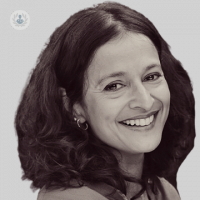An expert guide to supraventricular tachycardia (SVT)
Written by:In this informative article, highly respected consultant cardiologist Dr Anita Arya shares her expert insight on supraventricular tachycardia, a heart condition in which patients experience episodes of an abnormally fast heart rate. In this guide, the revered specialist details the symptoms patients typically experience and the strategies which can, in some cases, be used to control them. Dr Arya also reveals when treatment is indicated and the various approaches available.

What is supraventricular tachycardia and how does it affect the heart?
Supraventricular tachycardia, or SVT, affects around three to four people out of a thousand. Most often (in seventy per cent of cases), it is a relatively simple rhythm disturbance that comes from the top of the heart caused by an extra piece of wiring or circuitry that you are born with. In a small proportion, SVT can be caused by an irritable focus, where cells start to generate an electrical impulse on their own.
Although SVT may not have adverse effects on the heart itself, it can be very intrusive and may lead the patient to become very symptomatic with palpitations, chest discomfort, breathlessness or dizziness.
How is supraventricular tachycardia diagnosed?
SVT can be diagnosed based on the history given by a patient. People suffering from SVT will often complain of palpitations in a certain pattern, usually coming on abruptly and then going off suddenly.
If we suspect SVT, we often go on to do some monitoring of the heart. This could be a five-day heart monitor or some sort of wearable technology. These days, people are increasingly buying gadgets which record your heartbeat when you have symptoms. Usually, they provide at least a one or two lead ECG trace, which can be very useful.
What are the treatment options for supraventricular tachycardia?
Some patient don’t experience SVT very often and are able to control it with simple manoeuvres such as Valsalva, which is when you hold your breath and strain as if you are on the toilet. Other people are able to control their SVT by drinking a cold glass of water or by rubbing on one side of their neck. If you don’t have symptoms very often and they are not intrusive or you can control them, you may not need any treatment at all.
Patients who have slightly more frequent symptoms use the ‘pill in the pocket’ approach, where they take a pill only when they have an episode. Other patients take regular medication or opt for a keyhole procedure called ablation, where the heart is accessed through the leg and the abnormal circuit is cauterised.
Can supraventricular tachycardia be prevented or controlled through lifestyle changes?
We always advise a healthy lifestyle in general, with moderate caffeine and alcohol intake in particular. However, SVT is often congenital and cannot be controlled by lifestyle measures.
If you are concerned about SVT or heart related symptoms and wish to schedule a consultation with Dr Arya, you can do so by visiting her Top Doctors profile.


